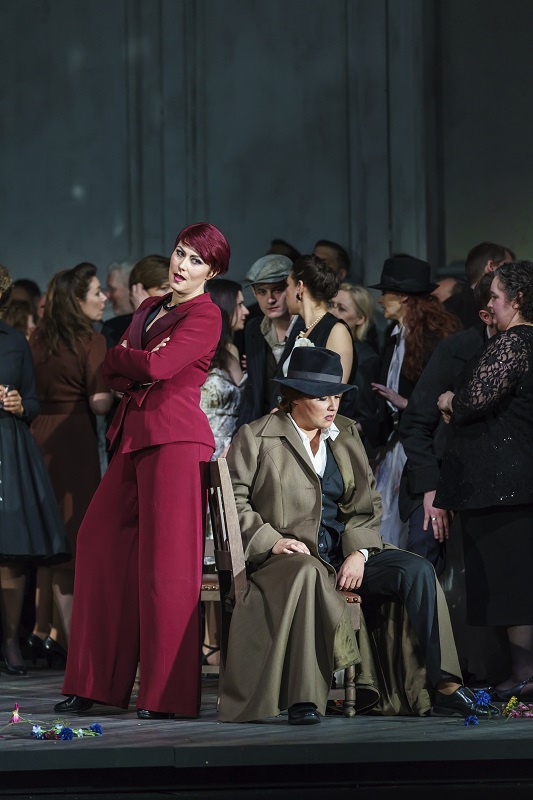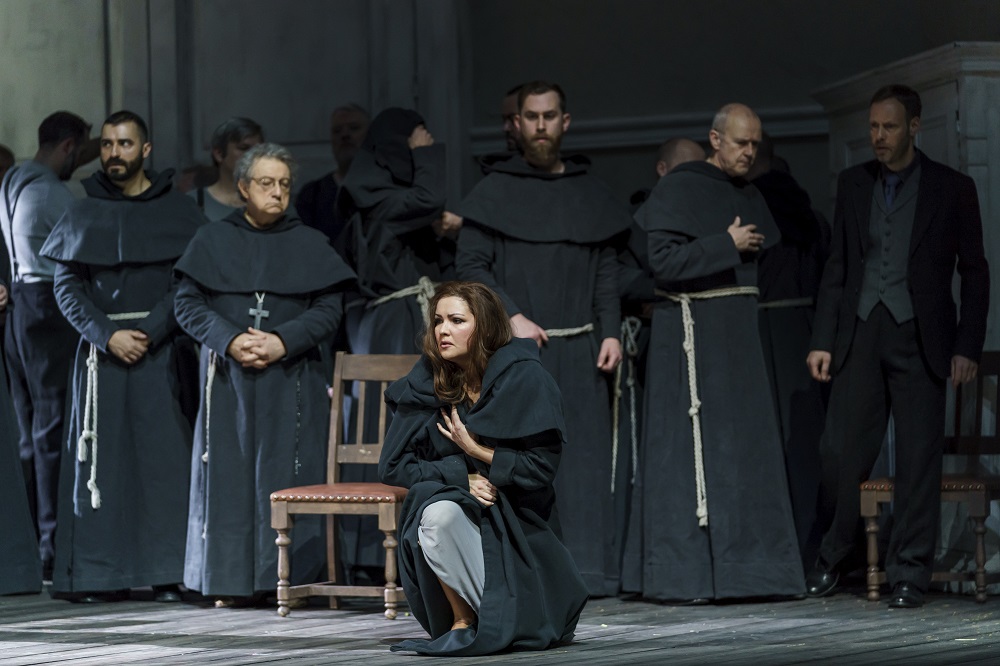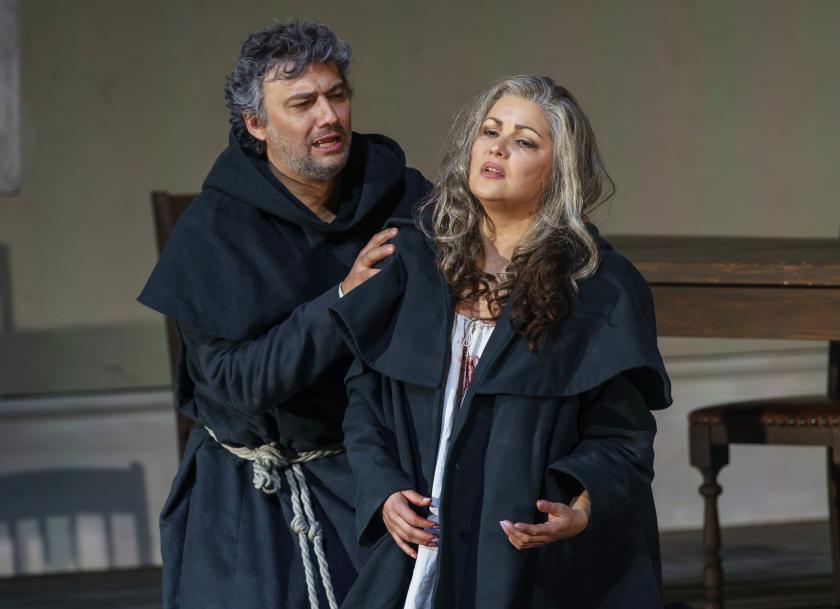When "Maestro" Riccardo Muti left the Royal Opera's previous production of Verdi's fate-laden epic, disgusted by minor changes to fit the scenery on the Covent Garden stage, no-one was sorry when Antonio Pappano, the true master of the house then only two years into his glorious reign, took over. He's now unsurpassable in the pace and colouring of the great Verdi and Puccini scores. Signs from his previous collaborations with once radical director Christof Loy and the glorious cast assembled were that this time round Forza would be a total triumph. In the end, several mountains gave birth to a mouse.
Perhaps I exaggerate, but the baseline in any production of this difficult, harsh but musically infinitely rich drama is that we should be moved to pity and terror by the lacerating attempts of two star-crossed lovers as they wander Spain and Italy to escape the vengefulness of the noble girl's brother, who wants their blood for the accidental death of their father. It's maddening, when Anna Netrebko and Jonas Kaufmann do so much vocally that is absolutely right, sometimes ideal, for the lirico spinto thrust of Verdi's writing for them, that they simply don't convey a hero and heroine in extremis. The singing of both is powerful, with plenty of quiet delivery as well as the artistry of the bel canto legacy; but in Netrebko's case the meaning is generalised, and Kaufmann has the thrill but not the Italianate sweetness of sorrow often needed for the demanding role of Alvaro. Loy has not been able to get them to jettison the stock hand gestures in favour of movements dictated by what they're singing about.  Consequently we never really get the power of the music to wound and torment, despite the characteristic intense high profile Pappano gets from the Royal Opera Orchestra in supporting lines: a bass phrase louring up to meet Kaufmann in his Act III aria, beautifully initiated by the clarinet who's his sorrowing companion in a scene where the military brass and offstage choruses, the nagging mid-range figures which drive the more heated parts of the big duets between Alvaro and the brother, Carlo (Ludovic Tézier, the testosterone-driven Verdi baritone to the life, but too loud too much of the time; pictured above with Kaufmann in Act II). The Overture is magnificent, and Loy looks set to deliver convincingly in two curtain-rises on two younger Leonoras acting out her religious fantasies in a bare room - the set could be borrowed from the same director's Tristan und Isolde, though hopefully the sight-lines are better from certain places in the house - before we get to the grown-up version.
Consequently we never really get the power of the music to wound and torment, despite the characteristic intense high profile Pappano gets from the Royal Opera Orchestra in supporting lines: a bass phrase louring up to meet Kaufmann in his Act III aria, beautifully initiated by the clarinet who's his sorrowing companion in a scene where the military brass and offstage choruses, the nagging mid-range figures which drive the more heated parts of the big duets between Alvaro and the brother, Carlo (Ludovic Tézier, the testosterone-driven Verdi baritone to the life, but too loud too much of the time; pictured above with Kaufmann in Act II). The Overture is magnificent, and Loy looks set to deliver convincingly in two curtain-rises on two younger Leonoras acting out her religious fantasies in a bare room - the set could be borrowed from the same director's Tristan und Isolde, though hopefully the sight-lines are better from certain places in the house - before we get to the grown-up version.
Yet despite the symmetrical image of the grey-haired hermit re-enacting her Pietà complex when finally reunited, but too late, with her Alvaro towards the end of the opera, the vision is not consistent. Loy seems to be telling us that for Leonora, there's no place but home, plus a monastery entrance and a crucifix replacing one of the walls. The panoramic dimension of the drama is lost; more worryingly, despite participants coming on at the end of each scene to set up the next, the curtain descends and we wait for some minutes for the resumption of the drama. How thrillingly Mark Wigglesworth at ENO made the case for driving on the music with no pause for applause, the open stage of Calixto Bieito's production allowing for a more epic sense of continuity.
 Wigglesworth started out by favouring Verdi's first version, with its shorter orchestral introduction, though Bieito rejected the abrupt ending where Alvaro joins the other corpses by leaping into the void. The trio Verdi composed as substitute in response to Catholic indignation at the suicide is an absolute beauty, and it ended the Royal Opera evening with a contained emotion not much in display elsewhere; here the sonorous combination of Netrebko, Kaufmann and Ferruccio Furlanetto as the Padre Guardiano (another loud one) and the pianissimo strings at the end justified Pappano's choice.
Wigglesworth started out by favouring Verdi's first version, with its shorter orchestral introduction, though Bieito rejected the abrupt ending where Alvaro joins the other corpses by leaping into the void. The trio Verdi composed as substitute in response to Catholic indignation at the suicide is an absolute beauty, and it ended the Royal Opera evening with a contained emotion not much in display elsewhere; here the sonorous combination of Netrebko, Kaufmann and Ferruccio Furlanetto as the Padre Guardiano (another loud one) and the pianissimo strings at the end justified Pappano's choice.
ENO's decision to place the second company scene in between the two confrontations between Alvaro and Carlo rather than as a divertissement finale made much more sense too. Loy's camp extravaganza (camp in more ways than one) may have wowed an audience ready to laugh at every turn of the melodrama - that in itself proves that the tension wasn't at the right pitch - but it had little connection with the hurly-burly of war. Programme images suggest the director was going for an Italian neo-realist film look, with a dash of more extravagant later Fellini, but the go-go boys, their choreography familiar from Otto Pichler's much more appropriate work in Barrie Kosky's stagings of The Nose and Carmen, don't fit, and some of the dancy-dancy movements for the chorus both here and in the earlier variety-act at the Hornochuelos inn are more worthy of an amateur opera company. A pity, because they sing superbly throughout.
The hard-to-motivate role of gypsy Preziosilla doesn't really work, either; she moves from trouser-suited glam to brothel-madam enigma in "consoling" Alvaro in Italy, and defuses the tension of his spat with Carlo by coming on in a green belly-dancer's costume. Finally she's hanging around, a wreck, at the monastery. Veronica Simeoni (pictured above with Netrebko and the Royal Opera Chorus) has presence - though it's not quite clear to what end - but the role needs a more opulent mezzo (maybe it will get that in the second cast's Aigul Akhmetshina later in the run). It was a surprise to see the ever-sympathetic Roberta Alexander as an anxious maid in the first scene, and there was promise from Michael Mofidian's Hornochuelos Alcade, hinting at a duel of the baritones with Tezier in Act II Scene 1.  Alessandro Corbelli's character-study of Brother Melitone (pictured above to the left of Netrebko) was, as ever, superbly observed, and he's still in fine voice. But we missed him when the first monastery scene yielded to the crucial duet between Leonora and the Father Superior. Looking a bit too chic in her menswear, Leonora would never reappear before the head of the monastery in her lingerie, or show her glossy hair to the assembled monks. Loy attempted a bit of the misogyny which Bieito had brought to the fore in the most harrowing scene of his hit-and-miss ENO production with the much more nuanced Tamara Wilson, but didn't follow through. Much better that vivid curate's egg, surely, than this director seeming to dither on what seemed to be a tight leash. But then maybe you can't achieve true music-theatre with the international set, especially if one of the principals isn't there for the final rehearsal. The lovers of star opera weren't disappointed, but Pappano deserved so much more, dramatically speaking, from his singers. Perhaps the best deal will be the BBC Radio broadcast on 25 May.
Alessandro Corbelli's character-study of Brother Melitone (pictured above to the left of Netrebko) was, as ever, superbly observed, and he's still in fine voice. But we missed him when the first monastery scene yielded to the crucial duet between Leonora and the Father Superior. Looking a bit too chic in her menswear, Leonora would never reappear before the head of the monastery in her lingerie, or show her glossy hair to the assembled monks. Loy attempted a bit of the misogyny which Bieito had brought to the fore in the most harrowing scene of his hit-and-miss ENO production with the much more nuanced Tamara Wilson, but didn't follow through. Much better that vivid curate's egg, surely, than this director seeming to dither on what seemed to be a tight leash. But then maybe you can't achieve true music-theatre with the international set, especially if one of the principals isn't there for the final rehearsal. The lovers of star opera weren't disappointed, but Pappano deserved so much more, dramatically speaking, from his singers. Perhaps the best deal will be the BBC Radio broadcast on 25 May.















Add comment